Turning points: Syria and the Russian diplomacy. Stalingrad syndrome.
“Damascus is the “Stalingrad” of Russian diplomacy. After years of geopolitical withdrawal, Moscow has chosen Syria as a way to revive its image of power in the world. “Not one step back” is the Kremlin’s new strategy, as it was for the Red Army along the banks of the Volga river during World War II. To be more convincing, the Kremlin has simultaneously flexed its muscles by supplying sophisticated […]
The European Union foreign ministers on March 23 decided to impose sanctions on a further 12 Belarusians, including businesspeople, and 29 Belarusian companies to punish the Lukashenka regime for the repression of political activists and civil society representatives, BelaPAN said.
In particular, the EU Council added the 12 persons to the 27-nation bloc’ list of those targeted by a travel ban and asset freeze, reported euroalert.net. They include individuals benefiting from or supporting the regime, as well as persons responsible for the repression of civil society and the democratic opposition in Belarus. 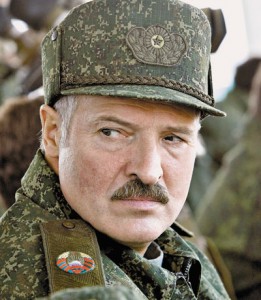
In addition, the EU Council froze the assets of 29 entities, which are controlled by persons subject to restrictive measures due to their role in supporting the regime.
“I am extremely concerned about what is happening with the civil society,” said Catherine Ashton, the EU’s high representative for foreign affairs and security policy, speaking ahead of the EU Council’s meeting in Brussels. “We have been extremely clear about the regime in Belarus that they release political prisoners. We would like to engage with them when they comply with what we have asked them to do.”
In an interview with the government`s news agency BelTA earlier this week, Andrey Savinykh, spokesman for the Belarusian foreign ministry, said that the EU should stop using pressure against Belarus if it wanted to “settle existing differences.”
Both Belarus and the EU will benefit from a “mutually acceptable settlement” of them, said Mr. Savinykh.
“The EU should in the first place drop the practice of reinforcing its sanctions on a regular basis,” said the spokesman. “The point is not about whether the sanctions are efficient. What is important is that this practice rules out the possibility of bringing sensibly and reasonably the positions closer to each other.”
On January 31, 2011, the EU Council imposed asset freezes and travel bans on 156 Belarusian government officials and other individuals for their role in “the violations of international electoral standards” in the December 14-19, 2010 presidential election and a post-election crackdown on civil society and pro-democratic supporters. The Council blacklisted more Belarusians later, placing on the list judges and prosecutors involved in the prosecution of post-election protesters, as well as the judge and the public prosecutor in the trial of prominent human rights defender Ales Byalyatski.
The EU Council`s Friday decision brought the total number of Belarusians on the blacklist to 234.
After the EU imposed travel bans and asset freezes on new Belarusian officials on February 27, the Belarusian foreign ministry “recommended” that the head of the EU delegation to Belarus and the ambassador of Poland to Belarus return to their capitals for consultations, while simultaneously recalling the country`s permanent representative in Brussels and ambassador in Warsaw.
All EU ambassadors have left Belarus since “in expression of solidarity and unity.”
Materials from BelaPAN, Naviny
Россия, Доброта может спасти мир.
22 Mar 2012 «Лучшие моменты этой политической зимы в России творили женщины. Как, например, та девушка, которая стояла 5 марта на постаменте памятника Пушкину и с детской гордостью держала в голубых рукавицах плакат «Нам не нужна путинская династия!» 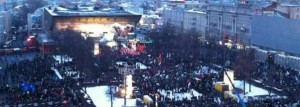 … …Маша Гессен лидер, новой российской оппозиции, «одна из важнейших организаторов демонстраций», Маша Гессен для «белого кольца» на Садовом организовала и теплые напитки, и денежки, чтобы иногородние студенты могли приехать на такси… Молодец, Маша. Ребята с НТВ тоже были бы в восторге…Наверное, каждая революция, не важно — красная, оранжевая или белая, — имеет своих Маш Гессен…
… …Маша Гессен лидер, новой российской оппозиции, «одна из важнейших организаторов демонстраций», Маша Гессен для «белого кольца» на Садовом организовала и теплые напитки, и денежки, чтобы иногородние студенты могли приехать на такси… Молодец, Маша. Ребята с НТВ тоже были бы в восторге…Наверное, каждая революция, не важно — красная, оранжевая или белая, — имеет своих Маш Гессен…
Ольга Алленова, журналистка, писала заметку в «Огоньке» о том, почему она больше не будет выходить на улицу, чтобы требовать смены режима…Ольга Алленова по выходным, когда дежурит знакомая медсестра, помогает ей в качестве волонтера в детском отделении больницы. Моет пол, кормит малышей-отказников, делает массаж детям с синдромом Дауна.
«Я никогда не забуду Мишкины глаза в тот первый день, когда его взяли на руки, — пишет она. — Он приник головой к моему плечу и смотрел на меня, не отрываясь, минут тридцать. Передать это словами невозможно. Я даже не слышала его дыхания — он весь замер, держась ручкой за мою медицинскую маску». Ольга Алленова считает, что держать брошенного всеми Мишку на руках важнее, чем бороться за смену режима….Скромные мысли, далекие от политики…Не штурмовать Кремль, а помогать слабым. «Если бы проблемы детей, недоедающих в больницах, собирали сотни тысяч людей на митингах, — пишет Алленова, — я думаю, дети больше бы не голодали». А для властей, кстати, каждое такое требование стало бы бомбой».
Статья – Штефан Шолль – Московский Комсомолец № 25897 от 22 марта 2012 г. Stefan Scholl Moskovskij Komsomolets.
Russian-NATO Cooperation in Ulyanovsk.
21 Mar 2012“Russia has suggested to NATO it could use its own airport near Ulyanovsk if Manas transit shipment centre is closed, Voice of America reported.
‘The Russian government plans to use the airport near Ulyanovsk as a transit point for NATO coalition troops in Afghanistan’, the statement said. ‘Moscow allowed NATO to supply coalition forces in Afghanistan through Russia by railway for three years. One of Russia’s airports in Ulyanovsk may be also be used to deliver military cargo’. 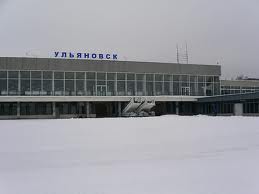
According to the plan, military aircraft will fly out of Kabul, then over Central Asia to land 3000 kilometres away in Ulyanovsk.
Russian Foreign Minister Sergei Lavrov told the Russian Duma members that the use of the airport by the NATO military is in Russia’s interest, as this will facilitate the orderly withdrawal of NATO troops from Afghanistan by December 2014 as was planned.
The agency stressed that the Russian leadership’s decision was announced the day after the Kyrgyz authorities told U.S. Secretary of Defence Leon Panetta that they did not intend to prolong the lease term of the U.S. Air Force base Manas which expires in July 2014.
Expert on security issues in Central Asia Joshua Kucera, working in Washington, thinks that this statement of the Kyrgyz leadership can simply mean that it is time to begin lease negotiations with the new president Almazbek Atambayev, Voice of America said.
Kucera said that Ulyanovsk will be a fall-back option if Manas is closed and on the other hand, Manas is a fall back option in case of overlapping the channels passing through the territory of Pakistan.”
From TREND News Agency
—
“NATO, Russia and the Central Asian’s countries have a number of common interests in the region, James Appathurai, NATO Secretary General’s Special Representative for the Caucasus and Central Asia told in an interview with atlantic-community.org.
Appathurai said he would like to reject the opinion that the West and Russia are competing for influence in the Central Asia.
“We have common interests in Central Asia. And I mean common with the Central Asian countries and NATO, and common between all three if we include Russia as well,” he said.
First common interest is the stability in Afghanistan as vital for all that Afghanistan does not once again begin exporting terrorism, extremism, or continue exporting drugs, which of course hit all, Appathurai mentioned.
“So we have an interest in stabilizing Afghanistan, shared by all of us. And the best way to do that is to cooperate,” he added.
Appathurai added that NATO, Russia, and Central Asia for example train together their counter narcotic officials, particularly Central Asian, Afghan but also now Pakistani.
Russia plays a very important role in this joint project with NATO allies, he said, and it works very well.
The other NATO’s interest in the region is to help the Central Asian countries reach their full potential, including as transit areas for trade, as production and transit areas for energy and that is a mutual interest for everybody, Appathurai added.
“The Central Asian countries are concerned that when 2014 arrives and the Alliance has a much smaller and different presence in Afghanistan, that they will be left with a problem or a growing problem of instability, and terrorism, and extremism, and drugs,” he mentioned.
The NATO is committed for the long term to Afghanistan’s stability and committed not just rhetorically or politically, the alliance will have people on the ground doing work to help the Afghans stabilize their own country, Appathurai stressed.
“We will also work with the Central Asian countries so that they can protect themselves better, fight against and defend against these many threats. So we’re going to offer them more consultation, more exercises, more joint training to help them beef up their own capacity to handle these problems,” he added.”
From TREND News Agency
Moldova, la speranza Timofti.
21 Mar 2012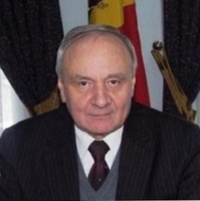
Nicolae Timofti
Finalmente! Dopo tre anni di vani tentativi, con un paio di voti popolari anticipati e disordini di piazza, la settimana scorsa la Moldova è riuscita ad eleggere un presidente. Era dall’aprile 2009, quando Vladimir Voronin lasciò l’incarico per la scadenza del mandato, che la repubblica ex sovietica non aveva un capo dello Stato nel pieno delle sue funzioni. Totale: 917 giorni di una crisi istituzionale interminabile, che stava minando seriamente le fondamenta del giovane Stato moldavo.
L’origine di tutte le tribolazioni è da ricercarsi principalmente in una Costituzione, scritta da giuristi poco esperti, con alle spalle un retaggio troppo sovietico. Il presidente è, infatti, eletto dai 101 deputati del Parlamento, che viene sciolto dopo tre votazioni fallite. Ma non solo: serve anche una maggioranza qualificata di 62 voti. In presenza di un’assemblea divisa la scelta del capo dello Stato è praticamente impossibile.
Così anche venerdì scorso al Parlamento moldavo si è assistito a vere e proprie scene da carbonari. La votazione, prevista in un primo momento per le 15, è stata anticipata all’improvviso alle 8 del mattino. Il Partito comunista, in netto contrasto con la maggioranza relativa, aveva indetto una manifestazione davanti ai palazzi del potere per le 13,30.
Per evitare i “franchi tiratori”, definiti più sbrigativamente “traditori”, i partiti dell’“Alleanza per l’integrazione europea” hanno fatto piegare ai propri deputati le schede da depositare nell’urna segreta in una ben determinata maniera. Tre parlamentari hanno vigilato sulla correttezza dei colleghi, mentre l’unico rappresentante del Pc, presente in aula, si è dilungato in un discorso semplicemente intimidatorio.
Conclusione: i tre fuoriusciti dal Pc, i quali hanno formato recentemente il gruppo socialista, sono stati determinanti. Il giudice 63enne Nicolae Timofti è stato eletto presidente, il quarto nella breve storia repubblicana, con 62 voti. Quanto tempo starà in carica è ancora un mistero, poiché i costituzionalisti locali interpretano ognuno a propria maniera le norme.
Considerata in epoca sovietica la “cantina” dell’“impero”, la repubblica latina dell’Urss ha terribilmente sofferto il passaggio all’economia di mercato. Nel 1992 una sua regione a maggioranza slava, la Transnistria, chiamata anche la “Lombardia” della Moldavia, si è separata dopo una guerra sanguinosa. Tutti i negoziati di riconciliazione nazionale sono finora falliti. 600mila moldavi su una popolazione di 4,4 sono emigrati all’estero, 100mila solo in Italia. Molti di loro detengono un passaporto romeno ed alcuni politici a Bucarest mirano in futuro a farla tornare sotto l’egida della madrepatria.
L’Unione europea si è impegnata a fondo per non vedere la “Dacia” di romana memoria trasformarsi in un buco nero. “Dobbiamo essere un ponte tra Est ed Ovest”, ha subito promesso Timofti. La sua costruzione, però, è tremendamente complessa!
In Russia non è ancora “primavera”.
14 Mar 2012 La “primavera” russa perde smalto e diversamente non potrebbe essere. Sabato scorso sull’Arbat sono scesi a protestare non più di 20-25mila moscoviti, molto meno rispetto alle oltre centomila persone delle precedenti manifestazioni “per elezioni pulite” del dicembre e del febbraio scorsi. Le presidenziali del 4 marzo sono ormai alle spalle e la delusione sta prendendo il sopravvento in un movimento composito che rischia di frazionarsi tra le sue molteplici anime. 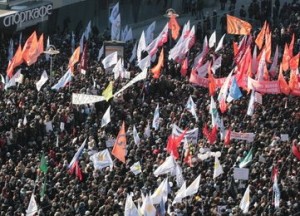
La “battaglia di Russia”, come l’ha definita Vladimir Putin, non è però conclusa, come si potrebbe superficialmente credere, ma è entrata in una fase più tecnica e meno spettacolare. Presto, infatti, verso l’inizio dell’estate il governo sarà costretto ad imporre misure economiche impopolari: i prezzi sono in pratica congelati da un anno per le elezioni, con un deficit di bilancio diventato un segreto di Stato. Allora, sì, che la partita ricomincerà molto più seriamente che queste legislative e presidenziali, diciamolo pure, addomesticate.
La variabile imprevedibile in questa situazione è rappresentata dal dio “petrolio”. Il suo prezzo alle stelle è l’unico elemento in grado di aiutare il “leader nazionale” ad ottemperare alle troppe promesse elettorali. Altrimenti, saranno dolori di pancia. Il modello Putin – ossia “proventi dalla vendita delle materie prime impiegati per lo sviluppo” – non funziona più. Servono risorse interne. Ai russi, soprattutto a quelli benestanti, bisognerà spiegare che pagare le tasse è necessario per offrire servizi ai meno abbienti. Altro che 13% sui guadagni, come ora.
In sintesi, l’autunno si annuncia caldissimo. I prossimi lunghi mesi serviranno alle opposizioni per organizzarsi meglio e creare quelle strutture politiche che adesso mancano del tutto.
A Mosca la domanda imperante in queste ore è come continuare, nel frattempo, la lotta contro Putin e i suoi alleati. La prima risposta è che certamente molta dell’attuale energia verrà spesa nella crociata contro la corruzione e la superbia della nomenklatura. Il mezzo per mantenere unita la protesta sarà Internet con i suoi social forum. In Parlamento sono già in corso, da settimane, consultazioni tra alcuni dei leader delle composite opposizioni, restate fuori dalla Duma alle legislative di dicembre per i soliti “giochetti”, e la squadra di Putin.
Questo elemento deve far riflettere, e non poco, gli osservatori indipendenti. Ma come è giustificabile una tale trattativa quando si sono appena tenute elezioni generali? Che investitura popolare hanno gli uni e gli altri rappresentanti dei due schieramenti? L’unica cosa positiva è che si è scelta la strada del dialogo e non quella della piazza per risolvere i problemi e concordare una seria riforma politica.
In conclusione, come nelle attese Vladimir Putin ha vinto il primo scontro, ma la battaglia non è affatto finita e lui ne è ben coscio. La “luna di miele” col Paese, durata ben 12 anni, è definitivamente finita. Ora il “leader nazionale” ha contro una larga fetta della società russa con cui giochi e giochetti non serviranno ad alcunché. Questa è l’ora dei fatti e delle riforme.
| Vladimir Putin | 63.60% | 45,602,075 |
| Gennady Zyuganov | 17.18% | 12,318,353 |
| Mikhail Prokhorov | 7.98% | 5,722,508 |
| Vladimir Zhirinovsky | 6.22% | 4,458,103 |
| Sergei Mironov | 3.85% | 2,763,935 |
| Invalid Votes | 1.11% | 836,691 |
Turnout |
64.5% |
70,864,974 on 109,860,331 Registered voters |
Source: Central Election Commission of the Russian Federation
Развод по-советски – The Soviet DisUnion. Giuseppe D’Amato. Презентация книги. Presentation.
3 Mar 2012
Развод по-советскиПрошлое и будущее постсоветского пространства. The Soviet DisUnionThe Past and the Future of the post Soviet area. |
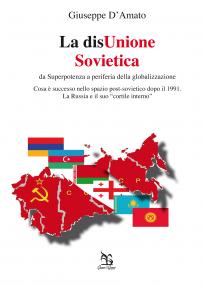 |
|
В ходе встречи состоится презентация книги La DisUnione Sovietica. da Superpotenza a periferia della globalizzazione. Milano, Greco&Greco editori, 2012. Присутствуют: ректор РГГУ профессор Е.И. Пивовар и автор книги Джузеппе Д’Амато, а также гости – дипломаты, журналисты.
Понедельник – 5-го марта в 14.00 часов – ауд. 220 Miusskaya sq, 6, Moscow. Metro Novoslabodskaja. Contact telephone: Rectorate (499)2506910 |
Russia is not Belarus, but this is little consolation. Its people took to the streets to demonstrate that Russians are no longer subjects of an empire, but citizens of a modern country. They want to play an active role in the decision process that will choose the path for the next decade. 
Let’s be clear. December’s legislative elections, preceded by the “dirtiest” campaign since the collapse of the USSR, were a major setback on the way to the attainment of full democracy. But they have awoken the long sleepy and apathetic Russian society.
In a deep popularity crisis, United Russia – the party of the Kremlin – had to get the maximum number of votes to launch Vladimir Putin’s presidential campaign. And, more or less, it reached its goals.
Nevertheless, in some situations form is more important than substance. And this is the case. The Russians, who do not share the Kremlin’s view, had no alternatives at the polls. There was no room for a vote of dissent or protest. “It is unbelievable! I had to vote for the communists so as not to give it to those” said an upset thirty-year-old Moscow specialist. Now, on March 4th, at the presidential elections, it is the same!
At the legislative elections the legal guarantor or arbiter, usually the head of State, was missing. Dmitry Medvedev was the “number one” candidate in the United Russia list and in his traditional pre-election message to the nation he invited his people “to choose those who have experience in overcoming the crisis.”
If this attitude from the authority in power towards competitors continues, imagine what would happen if suddenly an alternative serious candidate to Putin, and not the usual retiree, were to appear on the political scene.
Undoubtedly, for the first time since his arrival in power at the end of 1999, Vladimir Putin was not considered by his people the problem-solving “good czar” but rather was associated with the corrupt nomenklatura.
Politicians should understand that Russia has changed. It is no longer the place where people just listen to the voice of the Kremlin and complain “in the kitchen” like during the Soviet times. While the federal television channels broadcast hours of programmes on the government’s successes, Russians post the daily reality and express their anger on the internet. Social networks and blogs showed the dirty face of the electoral campaign.
Certainly, in past elections there were frauds, falsifications, and violations of the law as well. The difference is that today not only are common people in Russia armed with the latest technology and denounce the abuses but they have also lost their patience, especially in the regions where local authorities have become too arrogant. Muscovites and Peterburgers (a significant percent of the active electorate) have added the request for a new, more just society like in the West.
It is mainly the rich Russian middle class that is disappointed with life in its homeland. Sociologists are already analyzing today’s wave of emigration that is the strongest since the Bolshevik Revolution. The flight of capital seems to be unstoppable in these months. The Russians appear to be the first not to believe in their country.
The next President will have to deal with this psychological crisis and find the right therapy. Russians are no longer hungry like in 2000 when they gave up some of the achievements of the Nineties for stability. A fully open political system and more development of democracy are probably the needed medicine. Otherwise there will always be a Smartphone ready to unmask the authorities’ sins.
Giuseppe D’Amato
« … Русские, благодарите бога за свою оппозицию! Она у вас уникальна. Где еще в мире регулярно и добровольно выходят на мороз десятки тысячи людей, чтобы митинговать за честные выборы? Требование вполне политкорректное, хотя в российских условиях не очень реальное. Но оппозиционеры не расстраиваются. Они надевают костюмы да маски, выносят на улицы всякие куклы, шумят барабанами, балалайками. Смеются. Скандируют: «Улыбайтесь, обнимайтесь, любите друг друга!» Московские яппи с лозунгами западных хиппи. Этот российский карнавал намного веселей и душевнее, чем все митинги немецкого противоядерного движения в восьмидесятых и европейских антиглобалистов в нулевых, вместе взятые. 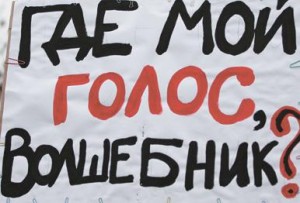
Они наивно мечтают о том, чтобы Владимир Путин ушел, хотя сами понимают утопичность своей мечты и упаковывают ее в иронию. Как те девушки с плакатом «Знаем, что ты еще раз хочешь. Но у нас голова болит!». …
Такой оппозиции и такой «революции» можно лишь позавидовать. Смешно сравнивать ее с кровавой «арабской весной». Или с «оранжевой революцией». У российской оппозиции нет таких кумиров, как Ющенко, Тимошенко или, еще хуже, Саакашвили. …
Это об оппозиции. Но всего одна пересадка на метро — и ты попадешь с Болотной на Поклонную или в Лужники, к сторонникам Путина, в совсем другой мир…
Не может не очаровывать суровое мужское обаяние, с которым политолог Сергей Кургинян кричит, говоря об оппозиции: «ОНИ — даже не просто воры, не просто жулики! ОНИ — исполнители иноземной злой воли. Причем ОНИ исполняют ее в ситуации, когда войска НАТО маневрируют у наших границ». Риторика блестящая, даже если она далека от реальности. И несколько старомодна. Что ж, норвежцам и литовцам уезжать в Португалию, чтобы устраивать маневры у себя дома? А в то же время китайцы не маневрируют у российских границ, но тихо и мирно осваивают русские Дальний Восток и Южную Сибирь. Время сейчас другое — международная экспансия изменила свой облик. Однако государственники ищут и находят угрозы и образы врага в прошлом. Как и образ мышления. … Но современная Россия неоднородна. Немалая часть ее граждан устала от подвигов и самопожертвования, от суворовских побед и царей-спасителей. Эти люди не хотят считать себя подданными. Слово «национальный лидер» произносят с улыбкой. Воспринимают выборы не как ритуал выражения доверия высшей власти, а как простое гражданское право избирать ту политику, которая их устраивает. Пока это выглядит наивно. Но они с надеждой смотрят в будущее. И цитируют другие строки из Лермонтова: «Прощай, немытая Россия,/Страна рабов, страна господ,/И вы, мундиры голубые,/И ты, им преданный народ».
Статья – Штефан Шолль – Московский Комсомолец № 25881 от 1 марта 2012 г. Stefan Scholl Moskovskij Komsomolets.
Christian Forstner, “l’immagine della Germania in Europa non si è indebolita per lo scandalo Wulff”.
26 Feb 2012 “Le dimissioni sono state un atto di responsabilità”. Questo il commento del noto politologo Christian Forstner a conclusione dallo scandalo che ha coinvolto la Presidenza federale tedesca.
“Chiariamo subito – dice il direttore della sede di Bruxelles della fondazione Hanns Seidel, vicina ai potentissimi cristiano-sociali bavaresi, – che Wulff ha lasciato l’incarico per ciò che aveva fatto prima di diventare presidente e non per aver commesso un qualcosa durante il suo mandato. La sua vera colpa è che in passato era stato troppo vicino agli uomini d’affari”. 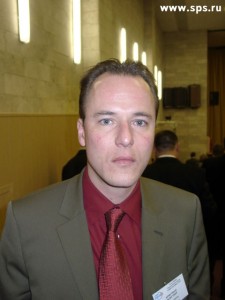
Ma da capo dello Stato Wulff ha tentato di bloccare la pubblicazione di alcuni articoli compromettenti. “Certo. Con la sua uscita di scena Wulff ha voluto difendere l’istituzione della Presidenza federale. La giustizia sta aprendo un’inchiesta penale”. Le sue dimissioni sono state un colpo alla cancelliera Merkel? “Da un certo punto di vista sì. E’ stata lei a proporlo alla carica di presidente. Ma la decisione di Wulff di farsi da parte le riconsegna spazio di manovra”. Prima Horst Koehler poi Christian Wulff, ambedue andatisene anticipatamente. Se possiamo dirlo, senza che qualcuno si offenda, la Merkel non è proprio fortunata con i candidati che sponsorizza. “Sì, ma attenzione. Il presidente federale in Germania è poco più che una figura simbolica. Ha una funzione di mera rappresentanza. Ad esempio, adesso durante la crisi dell’euro è stato il governo, nella persona della cancelliera, ad avere il potere di decisione. Non la Presidenza federale”.
Ecco analizziamo le dimissioni di Wulff da una prospettiva europea. Dal punto di vista dell’immagine la Germania non ne esce un granché bene. Ricordiamo che mai nella storia un suo presidente si era dimesso per lo scoppio di uno scandalo. “Non vedo alcun indebolimento del mio Paese a livello continentale. Ripeto il presidente da noi ricopre una carica simbolica. Se viene a Bruxelles va a trovare il re del Belgio e non va a trattare alla Commissione europea. L’estate scorsa Wulff aveva criticato in un discorso la Banca europea, quando questa aveva iniziato a comprare le obbligazioni dei Paesi in difficoltà tra i quali l’Italia. Malgrado le critiche in Patria non v’è stata quasi traccia delle sue parole all’estero. Se quelle stesse cose le avesse dette il suo predecessore l’economista Koehler, che era stato capo del Fondo monetario internazionale, la sua influenza sarebbe stata mediaticamente maggiore, ma nulla più. In questi mesi le decisioni europee vengono prese a livello di capi di governo. Persino i ministri hanno visto ridimensionato il loro ruolo”.
In conclusione, esiste in Germania una concezione di moralità nella politica diversa che in Italia o nel resto d’Europa. E se sì, perché? “Gli scandali ci sono anche da noi, soprattutto a livello regionale. La differenza viene fatta dall’opinione pubblica che mette fine alla carriera dei politici chiacchierati”.
Welcome
We are a group of long experienced European journalists and intellectuals interested in international politics and culture. We would like to exchange our opinion on new Europe and Russia.
Categories
- Breaking News (11)
- CIS (129)
- Climate (2)
- Energy&Economy (115)
- EU Eastern Dimension (85)
- Euro 2012 – Sochi 2014 – World Cup 2018, Sport (43)
- Euro-Integration (135)
- History Culture (198)
- International Policy (261)
- Military (74)
- Interviews (18)
- Italy – Italia – Suisse (47)
- Odd Enough (10)
- Poland and Baltic States (126)
- Religion (31)
- Russia (421)
- Survey (4)
- Turning points (4)
- Ukraine (176)
- Российские страницы (113)
Archives
- November 2020
- October 2020
- September 2020
- August 2020
- July 2020
- May 2020
- April 2020
- March 2020
- January 2020
- December 2019
- November 2019
- October 2019
- September 2019
- August 2019
- July 2019
- June 2019
- May 2019
- April 2019
- March 2019
- February 2019
- December 2018
- November 2018
- October 2018
- September 2018
- August 2018
- July 2018
- June 2018
- May 2018
- April 2018
- March 2018
- February 2018
- January 2018
- December 2017
- November 2017
- October 2017
- September 2017
- August 2017
- July 2017
- May 2017
- March 2017
- January 2017
- December 2016
- November 2016
- October 2016
- September 2016
- July 2016
- June 2016
- May 2016
- April 2016
- February 2016
- January 2016
- November 2015
- October 2015
- September 2015
- June 2015
- April 2015
- March 2015
- February 2015
- January 2015
- December 2014
- November 2014
- October 2014
- September 2014
- August 2014
- July 2014
- June 2014
- May 2014
- April 2014
- March 2014
- February 2014
- January 2014
- December 2013
- November 2013
- October 2013
- September 2013
- August 2013
- July 2013
- June 2013
- May 2013
- April 2013
- March 2013
- February 2013
- January 2013
- December 2012
- November 2012
- October 2012
- September 2012
- August 2012
- July 2012
- June 2012
- May 2012
- April 2012
- March 2012
- February 2012
- January 2012
- December 2011
- November 2011
- October 2011
- September 2011
- August 2011
- July 2011
- June 2011
- May 2011
- April 2011
- March 2011
- February 2011
- January 2011
- December 2010
- November 2010
- October 2010
- September 2010
- August 2010
- July 2010
- June 2010
- May 2010
- April 2010
- March 2010
- February 2010
- January 2010
- December 2009
- November 2009
- October 2009
- September 2009
- August 2009
Our books




